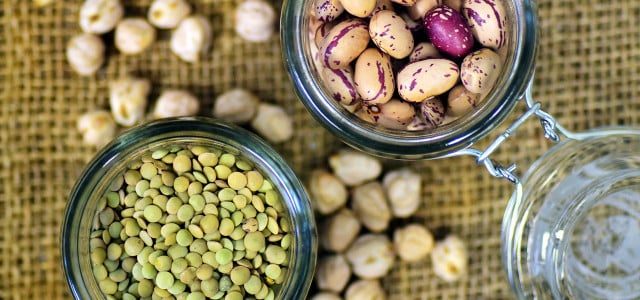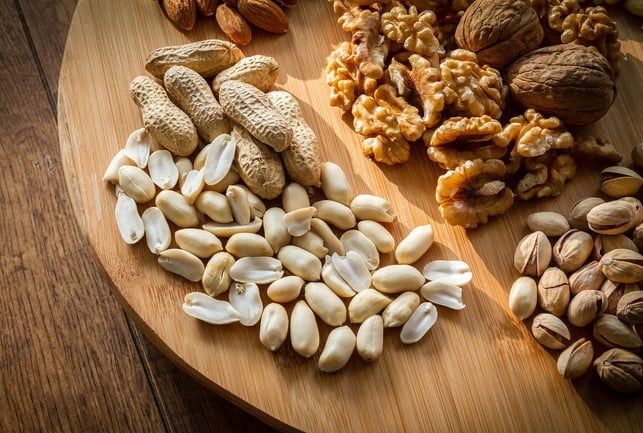
A protein deficiency puts a strain on the body and mind. In this article you will find out what symptoms indicate this and how it can be eliminated.
Along with carbohydrates and fats, proteins are one of the most important components of our diet. They provide building blocks for muscles, blood and organs, but also enzymes, hormones and the maintenance of a healthy immune system. An adult human needs around 0.8 grams of protein per kilogram of body weight. Exactly how much you need depends on how fit you are and how much you move. Athletes should tend to eat more protein-containing foods.
As healthy as proteins are, consuming too much protein can harm your body. A study from 2024 found a connection between increased protein intake and a higher risk of arteriosclerosis. Experts have also been discussing and researching for a long time whether too much protein can cause diabetes and kidney disease.
A protein deficiency is more serious for your health. This causes so much damage to the body that in severe cases it can even lead to death. Such an extreme protein deficiency is very rare in industrialized nations; it occurs more frequently in people in developing countries.
Protein deficiency: how do you recognize it?

(Photo: CC0 / Pixabay / Free Photos)
A protein deficiency means that the body has less protein available than it needs. In this way, body cells are damaged. The symptoms of a deficiency are often quite non-specific.
A protein deficiency can affect the body:
-
Reduction in muscle mass: If the body does not receive enough protein, the organism resorts to the proteins in the muscle tissue. As muscles break down, the affected person becomes weaker and loses weight.
-
Water retention: If the body lacks proteins, water can no longer be removed from the tissue. This results in swelling and also a “hungry stomach”, which is familiar from pictures of malnourished children.
-
Diseases: If the body can no longer produce enough antibodies, this can weaken the immune system. The body becomes more susceptible to infections.
-
Cravings: Proteins ensure stable blood sugar levels. If your body no longer has enough protein available, the value can fluctuate. Cravings follow.
-
Impaired wound healing: If a person does not consume enough protein, wound healing can be slowed down. Broken cells are repaired or renewed more slowly.
-
External appearance: Those affected can also see a protein deficiency on the outside. It can lead to hair loss, increase eye circles and cause more wrinkles.
If you are unsure whether you are suffering from a protein deficiency, you should definitely visit a doctor. If a deficiency remains untreated, serious consequences can occur. If the body remains under-supplied, it can cause digestive problems or weaken the respiratory and heart muscles.
What causes a protein deficiency?

(Photo: CC0 / Pixabay / jarmoluk)
In industrialized nations like Germany, an illness usually triggers a protein deficiency – in some cases it occurs because the affected person eats inadequately.
The following diseases can promote a protein deficiency:
-
Celiac disease, i.e. gluten intolerance
- Thyroid dysfunction
- Diseases of the liver or kidneys
- Alcohol addiction or drug abuse
- tuberculosis or
- AIDS
People who suffer from eating disorders can also suffer from protein deficiency. But vegetarians and vegans also have a higher risk of suffering from a protein deficiency – if they do not eat a balanced diet.
Here you will find 19 protein-rich snacks for everyday life – also vegan!
This is how a protein deficiency can be remedied

(Photo: CC0 / Pixabay / piviso)
Be sure to ask your doctor whether you are suffering from a protein deficiency and what is causing it. If illnesses are the cause of the deficiency, you will of course have to treat them very differently than a deficiency caused by inadequate nutrition. If the protein deficiency is due to an eating disorder, you should speak to your family doctor and seek therapeutic help.
If you have a protein deficiency caused by your diet, these tips can help you:
- Do you have problems eating enough? Set specific times for eating. Take your meals calmly and develop a routine. For example, take time for breakfast in the morning before you leave the house.
- Eat several small meals a day and have healthy snacks in between. Having a bowl of nuts or roasted seeds within reach will help you overcome your deficiency.
- Older people in particular lose their sense of hunger and therefore forget to eat regularly. It helps here if seniors don’t have to eat their food alone, but rather eat balanced meals together with others.
You can meet your protein needs from animal sources such as dairy products and eggs. For climate and animal welfare reasons, we recommend reducing the consumption of animal foods as much as possible. If you want to use these products, you should definitely pay attention to strict organic quality (recognizable by seals such as Demeter and Naturland) and avoid foods from factory farming. The living conditions for fattening animals and laying hens are often catastrophic. In addition, many fish species are threatened by overfishing.
You can also remedy your deficiency with plant sources. This is better for the environment and animal welfare. Nuts, seeds, kernels, beans, lentils and quinoa provide the necessary proteins. You can find a good overview here: Protein-rich foods that you should know (list).
Read more on Techzle\.com:
- Protein bread: Simple recipe to bake yourself
- Make your own protein bars: vegan recipe for sporty people
- Gain weight healthily: tips for your nutrition plan
Edited by Adriana Jodlowska
** marked with ** or orange underlined Links to sources of supply are partly partner links: If you buy here, you are actively supporting Techzle\.com, because we then receive a small part of the sales proceeds. More info.